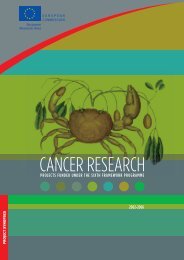I527-290 ESRIF Final Report (WEB).indd - European Commission
I527-290 ESRIF Final Report (WEB).indd - European Commission
I527-290 ESRIF Final Report (WEB).indd - European Commission
You also want an ePaper? Increase the reach of your titles
YUMPU automatically turns print PDFs into web optimized ePapers that Google loves.
236<br />
11.2.3 Violent radicalisation<br />
Understanding and counterstrategies<br />
Today’s scientifi c research into violent radicalisation must be considered fragmentary and embryonic at best. Resources<br />
needs to be developed that provides cohesive focus for existing fragmented research eff orts across national boundaries.<br />
Some baseline research has been conducted that provides useful direction. The <strong>European</strong> <strong>Commission</strong> through its network of<br />
experts commissioned four studies during 2007-8 that focused on: 1) triggering factors for violent radicalisation; 2) the beliefs,<br />
ideologies and narratives of violent radicals; 3) recruitment and mobilisation of support; 4) best practices in preventing and<br />
countering radicalisation.<br />
Research is needed as well on the mechanisms of radicalisation as on counter radicalisation eff orts.<br />
The following ten research suggestions provide a comprehensive approach to the next wave of research into violent<br />
radicalisation.<br />
1. State-of-the-art research inventory into radicalisation<br />
Research into violent radicalisation is fragmentary and often fails to integrate the dynamic interrelationship with<br />
countermeasures against the terrorist threat. This dynamic relationship changes constantly the nature of the radicalisation<br />
challenge. No research exists that captures this evolving complexity.<br />
More research needs to be conducted that encapsulates the existing growing literature, theories and methods into<br />
radicalisation research; models and existing fi ndings which are critiqued and accumulated to prepare the way for the next<br />
wave of research. Much research focuses on the pathways into radicalisation and some have emerged on disengagement<br />
and exit strategies out of radicalisation networks and milieus. There needs to be a critical evaluation of the strengths and<br />
weaknesses of existing research and future research priorities. More research needs to focus on the connectivity between<br />
radicalisation as a phenomenon and the way in which countermeasures aff ect and changes it. More interdisciplinary<br />
research agendas are necessary as radicalisation is simultaneously involving individual socio-psychological factors; social<br />
and political factors; religious dimensions; cultural identity and group dynamics. Capturing the dynamics and complexity of<br />
these interrelationships in specifi c national contexts and over time is a prioritised research theme.<br />
2. Violent Radicalisation in Education<br />
Research into radicalisation has found that education can be considered both as a key infl uencer and major intervention<br />
point. This means that more research needs to focus on curriculum development that takes into account radicalisation;<br />
best practices and models on how to approach and achieve eff ective delivery across levels and milieus; strategies for<br />
responding to radicalisation especially in higher education; capacity building and inter cultural competence development<br />
within educational establishments; for teachers; and for local public offi cials. Development of confl ict resolution models<br />
needs to be considered within education to better build resilience against the forces of radicalisation and as a mechanism<br />
to handle cultural clashes that occurs in identity building among youths. How do youths navigate between diff erent<br />
cultural identities; does mentorship work and what are eff ective mechanisms to engage youths on radicalisation issues?<br />
What should the role be for civil society in dealing with radicalisation?<br />
3. Best Practices in Crisis Management Dealing with Terrorism<br />
Terrorism events severely test social cohesion within societies, whether it is small events that unleash vast social forces<br />
(murder of Theo van Gogh in 2004), a synchronised major event (London bombings 2005) or a metaphorical war (Muhammad<br />
Cartoon controversy in Denmark). Research needs to focus across contexts and incidents to compare the best practices and<br />
eff ectiveness of diff erent approaches how to respond to and communicate most eff ectively with the public. The end game<br />
of these strategies is to assert government control and to manage down the eff ects of the violence and any associated<br />
polarisation between communities. More research needs to be conducted on best practice models how to best respond<br />
to crisis events from a communication and crisis management perspective. What are the lessons learned from diff erent<br />
types of events? What type of messages needs to be crafted; how is this credibly delivered and how is this best delivered<br />
in a fragmented media environment?<br />
<strong>ESRIF</strong> FINAL REPORT - PART 2 • Working Group: Human and Societal Dynamics of Security

















